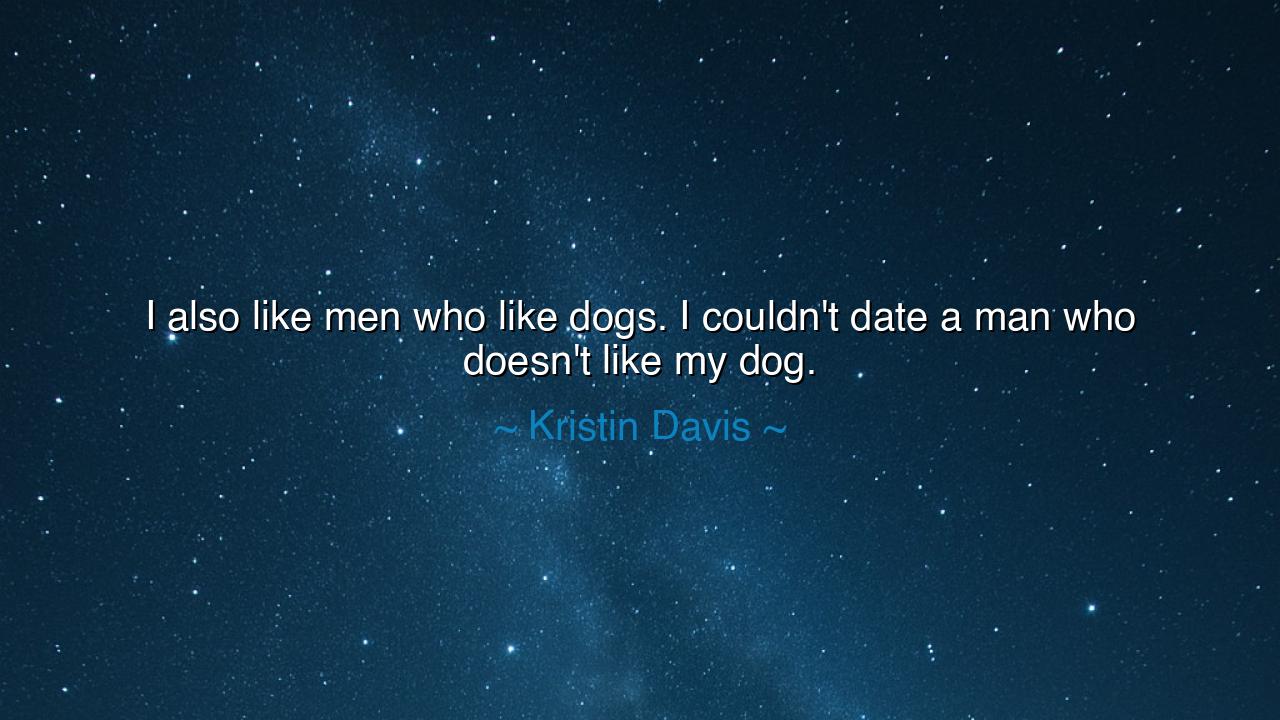
I also like men who like dogs. I couldn't date a man who doesn't






In the gentle yet resolute words of Kristin Davis, we hear a wisdom cloaked in simplicity: “I also like men who like dogs. I couldn’t date a man who doesn’t like my dog.” To the unseeing ear, this may sound like a lighthearted remark, a mere preference of companionship. Yet beneath it lies an ancient and enduring truth — that the way one treats innocence, loyalty, and kindness reveals the nature of their soul. For in her affection for her dog, Davis speaks of more than animals; she speaks of character, of empathy, of the quiet covenant between love and compassion.
To love a dog is to recognize the purity of life unspoiled by greed or guile. A dog asks for nothing but affection, and offers in return the most steadfast devotion known to humankind. When Davis declares that she could not be with a man who does not love her dog, she is not merely drawing a line of preference — she is proclaiming a sacred standard of the heart. She is saying: I will not love one who cannot love what is gentle. In the ancient world, philosophers and poets alike believed that the measure of a person’s virtue was not in how they treated the mighty, but how they treated the powerless. For the tender heart sees divinity in all living things, while the cruel heart sees only utility.
Consider the story of Diogenes of Sinope, the philosopher who lived with little more than his cloak and his faithful dog. When Alexander the Great, ruler of the world, approached him and asked if there was anything he could do for him, Diogenes replied only, “Yes — step out of my sunlight.” His dog sat at his side, content, loyal, unbothered by wealth or power. Diogenes often said that he learned more of honesty and simplicity from his dog than from men. It is this same reverence that Davis expresses — that those who love animals understand something eternal about love itself: it must be selfless, instinctive, and unconditional.
The ancients held that to mistreat an animal was to wound one’s own spirit. The Egyptian goddess Bastet, protector of the home, was honored through the care of cats, while in Rome, the guardians of the hearth revered dogs for their loyalty and courage. In these traditions, animals were not mere companions but mirrors of the soul — reflections of the love or hardness within their human masters. Thus, when Davis says she cannot love a man who does not love her dog, she is, in truth, declaring that she cannot share her life with one whose soul lacks tenderness. For one who turns away from innocence will one day turn away from love.
Her quote also speaks to compatibility — not in hobbies or tastes, but in values. The man who dismisses her dog dismisses part of her own heart, for in the creature she loves lies the embodiment of her compassion. The bond between a person and their pet is sacred, a silent language of trust and belonging. To reject that bond is to reject a piece of their identity. Davis, in her quiet assertion, teaches that true partnership is not merely attraction or admiration, but shared respect for what the other holds dear. A union that cannot make room for love’s smallest expression will never survive love’s greatest trials.
The story of St. Francis of Assisi further illuminates this truth. He called every creature his brother or sister — the birds, the wolves, even the fish of the sea. To him, all life was a song of divine unity. When others feared the wolf of Gubbio, Francis went to it unarmed, spoke to it with gentleness, and turned its ferocity into friendship. His compassion transformed not just the beast, but the hearts of the townspeople who witnessed it. In this way, the love of animals becomes not sentimentality, but a spiritual discipline, teaching humans the language of peace.
The lesson, then, is this: love cannot exist where compassion does not. To test a person’s heart, watch how they treat what cannot benefit them — a dog, a child, a stranger. Beware the one who withholds kindness from the voiceless, for they will soon withhold it from you. And cherish the one whose heart opens easily, who delights in simple joys, who loves not only the great but also the small. Such a person understands that life’s deepest bonds are built on care freely given.
So, dear listener, remember the wisdom hidden in Kristin Davis’s words: that love must include, not exclude; that to share your heart is to share all that your heart cherishes. Let no one into your life who cannot kneel down to greet your dog, for the one who stoops low to kindness will rise high in love. The heart that cannot see beauty in innocence is a barren field — but the heart that loves a dog will never forget how to love a soul.






AAdministratorAdministrator
Welcome, honored guests. Please leave a comment, we will respond soon